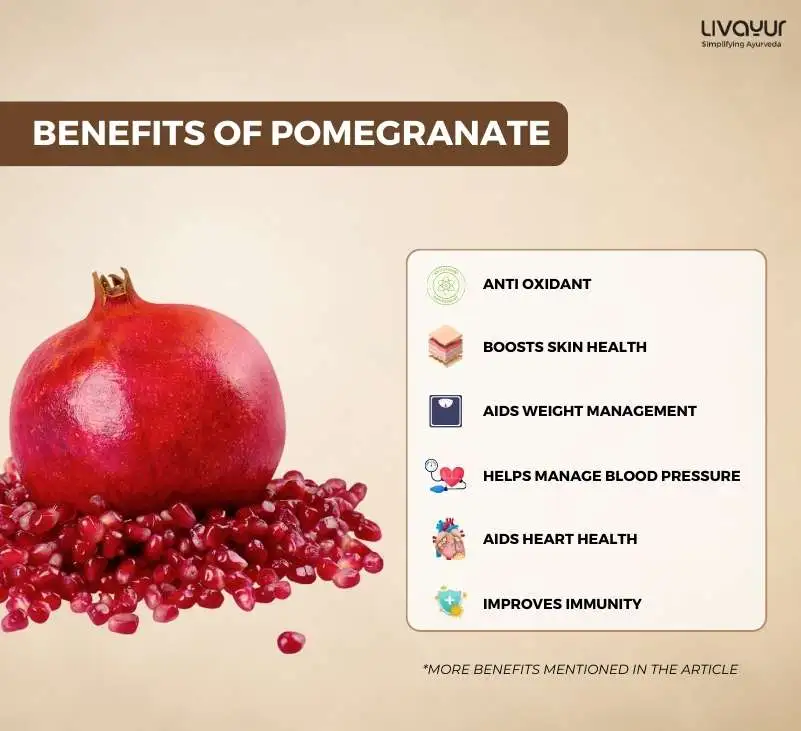
Pomegranates are among the world’s most ancient fruits. References to this fruit can be found in historical records from different parts of the world, including the Middle East and Asia. The fruit also has a long history of cultivation in the Indian subcontinent and has been highly regarded in Ayurveda for its health benefits. The pomegranate fruit is still grown across central and southern India. The fruit offers incredible health benefits due to its extensive nutritional profile. This article will talk about the pomegranate benefits for health and much more. So, read on:
Nutritional value of pomegranates
The health benefits of pomegranate seeds and its juice may be attributed to its many nutrients. The table below shows the various nutrients and their values in 100 grams of edible pomegranate.
| Nutrients | Values |
| Carbohydrate | 17.17 g |
| Dietary Fiber | 0.6 g |
| Fat | 0.3 g |
| Protein | 0.95 g |
| Zinc | 0.12 mg |
| Potassium | 259 mg |
| Iron | 0.3 mg |
| Calcium | 3 mg |
| Magnesium | 3 mg |
| Phosphorus | 8 mg |
| Vitamin C | 6.1 mg |
| Vitamin B1 | 0.03 mg |
| Vitamin B2 | 0.063 mg |
| Vitamin B3 | 0.3 mg |
| Vitamin B5 | 0.596 mg |
| Vitamin B6 | 0.105 mg |
| Vitamin B9 | 6 mcg |
The health benefits of pomegranates
1. Offers antioxidant protection
Pomegranates are rich in antioxidants that protect the body from free radical damage linked to inflammation and several chronic diseases, such as cancer, diabetes, cardiovascular disease, and neurodegenerative disorders. Pomegranates contain several antioxidants, such as punicalagin, anthocyanins, hydrolyzable tannins, and beta-carotene. [1] [2]
2. Makes your skin healthy
The natural beauty industry has popularised the benefits of eating pomegranate for the skin. One can experience the improved texture of the skin both by consuming the fruit and applying its topical extracts to the skin. The fruit’s vitamin C content is important for collagen synthesis, which helps to preserve skin elasticity and health. Also, the fruit extracts can offer protection against sun damage. [1]
3. Supports weight management
Half a cup of pomegranate seeds measuring about 90 grams contains just 72 calories, but it is high in nutrition, giving you 12% of your fiber requirement and 10% of vitamin C. Apart from pomegranate calories, much of the fiber in the fruit is insoluble fiber, increasing satiety and stabilizing blood sugar, thus helping with weight loss. [2]
4. Reduces blood pressure
This health benefit of pomegranate can protect you against kidney damage, stroke, and heart disease. In other words, the pomegranate benefits for blood pressure control are vital in preventing fatal diseases triggered by high blood pressure. [1]
5. Controls cholesterol
Pomegranate health benefits for heart health may be linked to its effect on cholesterol levels. It can help lower LDL or bad cholesterol levels and reduce hepatic lipid peroxidation, a factor responsible for heart disease progression. [1]
6. Strengthens heart health
Pomegranates can manage all the risk factors for cardiovascular diseases, such as high blood pressure or hypertension, high LDL cholesterol levels, and high blood sugar. Pomegranates can also prevent or reverse atherosclerosis and plaque build-up in the arteries, lowering the chances of heart attack or stroke. Pomegranates do this by enhancing the production of nitric oxide. This molecule relaxes and widens the blood vessels, improving blood flow as well as oxygen delivery to the heart and other organs. [1]
7. May help in cancer prevention
Another benefit of pomegranates is their potential to prevent or treat some types of cancer. Pomegranates have been found to inhibit the proliferation of various cancer cells, such as prostate, breast, colon, lung, and skin cancer. [1]
8. Treats erectile dysfunction
Although eating fruits is generally considered healthier than drinking juice, a study found that pomegranate benefits may also be derived from drinking the juice. It showed that consuming about 230 ml of pomegranate juice a day could improve the quality of erections during intercourse. [6]
9. Helps manage rheumatoid arthritis
This is another health benefit of pomegranate, linked to its antioxidant content. A study published in the International Journal Of Clinical Practice demonstrated that pomegranate antioxidants reduced inflammation and improved the management of rheumatoid arthritis symptoms. [1]
10. Promotes musculoskeletal health
Pomegranates are rich in vitamin C, which does more than just improve your immunity power. The vitamin is needed for wound healing, iron absorption, and cartilage, muscle, and bone structure formation. [1]
11. Improves exercise performance
Pomegranate benefits for athletes and bodybuilders are notable, as research shows that pomegranate accelerates muscle recovery and boosts performance. As a result, recovery time is reduced, and exercise duration can be increased. [5]
12. Helps regulate blood sugar
This is one of the many pomegranate seeds benefits that you cannot get from the juice as it is linked to the presence of fiber. In addition to blood sugar regulation with fiber, pomegranates also contain compounds that can help lower fasting blood sugar levels. [1]
13. Prevents kidney stone formation
When it comes to kidney health, most people think of cranberries, but pomegranates can also be helpful. Phytophenols in pomegranates have been shown to reduce stone formation, making it a healthy antidote to kidney stones. [3]
14. Improves memory
Drinking pomegranate juice is one of the tastiest ways to boost your brain function, as research indicates that daily intake of pomegranate juice could improve learning skills and memory. [4]
15. Protects against Alzheimer’s Disease
There is also evidence that pomegranates may offer some protection against degenerative brain diseases like Alzheimer’s that are associated with aging. Consumption of the fruit may prevent amyloid plaque formation and reduce markers of Alzheimer’s disease [1]
Amazing recipes with pomegranates
Pomegranate salad
Adding pomegranate seeds to a conventional salad adds crunchiness and taste. You can use chopped carrots, cucumber, and boiled green peas or baby corn in the salad, along with pomegranate seeds. Once you have mixed all the salad ingredients in a bowl, add some honey and olive oil and give the mixture a good toss. Your hearty salad is ready!
Pomegranate chutney
This unique chutney with a tempting crimson look can be a tasty side dish for your breakfast. To make this chutney, you need to combine pomegranate seeds with roasted cumin seed powder, crushed garlic cloves, and the tempered mix of curry leaves and mustard seeds.
Pomegranate halwa
This gelatinous halwa will steal your heart. To prepare this halwa, combine cornflour with suji or semolina and sugar syrup and cook the mixture in pomegranate juice. Use lots of dry fruits to add to its richness.
Pomegranate pudding
To make this pudding, you need to mix ground pomegranate seed pulp with cornflour and sugar. You have to cook the mixture over a low flame until the mixture thickens. Also, add some butter to give it a creamy texture. Once you have refrigerated the pudding, you can top it with pomegranate seeds and serve.
How to consume pomegranates? [1]
- As juice: You can juice the fruit and drink it.
- As raw, chewable seeds: You can chew the seeds.
- By adding to various recipes: You can add pomegranate seeds to your salads and desserts and enjoy!
- As health supplements: You can take them as supplements like capsules and tablets.
- As beverage tea: The dry extracts of the leaves and seeds may be used to prepare tea.
- As a spice: You can use the pomegranate seeds as a spice called ‘Anardana’ in various culinary preparations.
How do you extract the seeds from the seed pods?
1. Cutting the fruit
In whatever way you consume the pomegranate fruit, you must first master the art of cutting the fruit perfectly. First, you need to cut the fruit into two halves and then cut the two halves into smaller halves again. So, once you finish cutting, you’ll have four-quarters of the fruit.
2. Cleaning & collecting the seeds
- Next, take a bowl of water and place all quarters in the bowl. Start rubbing with your fingers so that the seeds start popping out and get separated from the arils.
- Transfer the cleaned pomegranate seeds to a separate bowl for use.
- Discard the water that you have used to clean the seeds.
Pomegranate Side Effects [7]
1. Diarrhea: While pomegranate has many health benefits, some people may experience some mild side effects. A few people have noticed side effects such as diarrhea or stomach upset.
2. Allergic reactions: Also, some have shown allergic reactions to pomegranate.
Whether this fruit is safe for pregnancy and breastfeeding is not clearly known due to a lack of adequate research on this matter. Therefore, pregnant women and breastfeeding mothers must consult their healthcare provider before taking this fruit.
FAQs
1. How to juice pomegranate at home?
• First, you have to cut the fruit with the help of a sharp knife.
• Then, you have to break the fruit open.
• Next, you must scoop out the red pomegranate pearls or seeds.
• White arils will be attached to the seeds. Put the seeds in a bowl of cold water and gently rub with your hands to remove the arils.
• After cleaning thoroughly, transfer the seeds to a blender jar and run the blender.
• Next, strain the mix that you get to obtain the clear juice. It would help if you pressed the pulp with the spatula to get the juice. Place a bowl under the strainer to collect the juice.
2. How much pomegranate juice can I drink per day?
You can drink up to 250 ml of pomegranate juice per day.Is the pomegranate fruit mythologically and historically significant?
3. Is the pomegranate fruit mythologically and historically significant?
Yes, it is. The fruit has always been revered for its beauty. In the realm of ancient designs and architecture, this fruit has been featured quite often. In the past, this fruit was considered a symbol of fertility, abundance, and sanctity.’
4. Which country is famous for the production of pomegranate?
The leading producers of this fruit are India and China, followed by countries like Afghanistan, Turkey, and Iran.
5. Why is the pomegranate fruit so bright red?
Pomegranate fruit has a pretty red colour which attracts. The red pigment comes from anthocyanins in the fruit. [8]
6. What are the Ayurvedic properties of pomegranate?
The Ayurvedic properties of pomegranate are:
• Guna (Qualities) – Snigdha (oily, unctuous), Laghu (light)
• Rasa (Taste) – Kashaya (Astringent), Amla (Sour), Madhura (Sweet)
• Veerya (Potency) – Anushna (Neither hot nor cold)
• Vipaka (Taste post digestion)- Amla (Sour), Madhura (Sweet)
Conclusion
With all of these pomegranate benefits, there’s no denying its reputation as a superfood. The pomegranate fruit is also versatile and easy to include in your diet as the seeds can be eaten raw, added into salads, mixed in with breakfast cereal or smoothies, and so on. To enjoy all of the health benefits of pomegranate, make sure that pomegranate is a part of your healthy, balanced diet.
Disclaimer:
This article is written from a health and lifestyle perspective. It is not a substitute for medical advice.
References
- Potent health effects of pomegranate
- Antioxidant and Weight Loss Effects of Pomegranate Molasses
- KIDNEY STONE TREATMENT BY POMEGRANATE (PUNICA GRANATUM)
- Memory boosting effect of Citrus limon, pomegranate add their combinations
- Effects of pomegranate supplementation on exercise performance and post-exercise recovery in healthy adults: A systematic review
- Efficacy and safety of pomegranate juice on improvement of erectile dysfunction in male patients with mild to moderate erectile dysfunction: A randomized, placebo-controlled, double-blind, crossover study
- Pomegranate
- A “White” Anthocyanin-less Pomegranate (Punica granatum L.) Caused by an Insertion in the Coding Region of the Leucoanthocyanidin Dioxygenase (LDOX; ANS) Gene



















